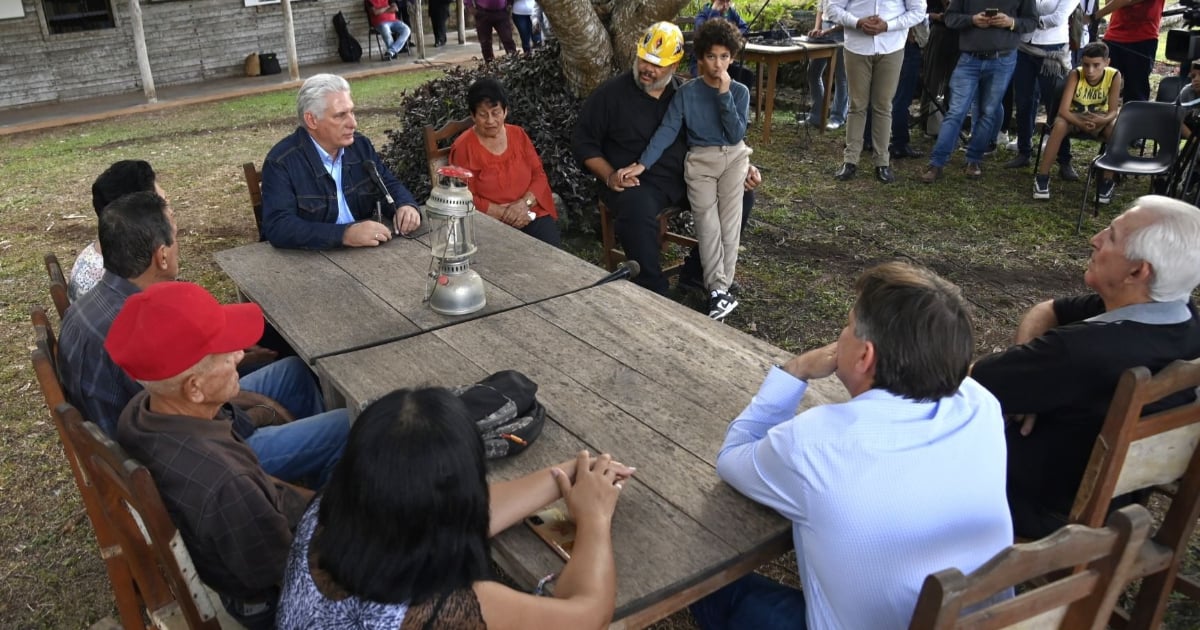
Related videos:
While Cuban families are struggling to celebrate Christmas due to the economic crisis, leader Miguel Díaz-Canel took to his social media on Tuesday to recall Fidel Castro's first Christmas Eve in the Ciénaga de Zapata.
The message shared on the social network X, steeped in cynicism, praises the individual who was the country's most significant dictator, responsible for censoring and sidelining this celebration for decades, as well as unleashing a fierce persecution against religious individuals.
It was only after the visit of Pope John Paul II in 1998 that December 25 was once again declared a holiday, marking a timid official return of Christmas in Cuba.
Despite the convenient historical omission, Díaz-Canel stated: "Thank you, Soplillar, thank you, cenagueros, for welcoming us and joining us in the 65th anniversary of the Christmas Eve with Fidel in 1959. No matter how tough the times may be, that year changed Ciénaga forever, turning it into an emblematic and prosperous place."
The government's publication aimed to exalt Fidel Castro's legacy by commemorating, alongside the residents of Soplillar, the anniversary of the Carboneros' Dinner on Christmas Eve of 1959.
However, the assertion that the Ciénaga de Zapata is now an "emblematic and prosperous place" not only contrasts with the reality of one of the impoverished regions of Cuba, but also highlights the regime's attempt to sugarcoat its historical narrative while the country faces an unprecedented crisis.
The supposed prosperity mentioned has sparked outrage and a wave of criticism on social media, where many users have questioned and strongly refuted this claim.
A profile of X, who goes by the name Libertad, stated: “Could you please explain to all of us the 'prosperity' of the Ciénaga where you saw it? No food, no hospitals, no transportation. If you went to another Ciénaga, please let us know. There isn't even the dinner that the Destroyer of Cuba used to deceive them.”
"An emblematic and prosperous place? Which galaxy are you talking about, Canel? Prosperity doesn’t exist in Cuba; there has been a backwardness of over 50 years, and if things keep going this way, soon people will be living in caves. They've been cooking with coal and firewood for a long time now. How prosperous and advanced, indeed! And the best part is how much it hurts us!" replied the user 1947_freedom.
Antonio Iglesias Pérez also expressed his outrage: “It is boundless cynicism to talk about Christmas Eve in Cuba, a dictatorship that has destroyed everything, including Cuban families. The regime keeps its people in darkness, with thousands of prisoners who cannot be with their loved ones, and a populace that is hungry and sad as their lives slip away in this misery.”
Messages like these, rather than inspiring hope, only fuel the frustration and indignation of those who must confront the harsh reality that the Revolution, praised in every speech, promised to change.
In another post, Díaz-Canel wrote: “We are still processing the emotions of this December 24th with Haydee, Chávez, Bonachea, Nemesia, and other residents of Soplillar, along with the great Kcho, who reconstructed the huts of the museum dedicated to the memorable night when Fidel spent Christmas Eve sharing the humble table of the inhabitants.”
The mention of Kcho, known for his unconditional support of the regime, and the reconstruction of the bohíos as part of a museum, is particularly cynical, given that the artist and National Assembly representative has been accused for years of gender-based violence and alleged sexual abuse of minors.
Meanwhile, the true reality of the Cuban people is characterized by celebrations overshadowed by scarcity and a critical situation in the electricity supply.
This Tuesday, Cuba's Electric Union (UNE) announced a generation deficit that led to a dark Christmas Eve for millions of Cubans, with a projected power outage of 1,314 MW during peak hours.
Even on Christmas Day, Cubans will not be able to be at home with electricity, as the UNE announced a potential service disruption of up to 1,280 MW during peak hours, concentrated in the central-eastern region due to high energy transfers to that area.
Frequently Asked Questions about Fidel Castro's Christmas Eve and the Crisis in Cuba
How does Díaz-Canel justify the prosperity in the Ciénaga de Zapata?
Díaz-Canel claims that the Ciénaga de Zapata is an "emblematic and prosperous place" due to the changes he says took place since Christmas Eve of 1959 with Fidel Castro. However, this statement has been widely criticized and refuted by locals in the region, who point to the lack of development and basic services.
What has been the reaction of Cubans to Díaz-Canel's statements about Christmas and Fidel Castro?
Díaz-Canel's statements have sparked indignation and criticism among Cubans, who find his words cynical given the current crisis facing the country. Many citizens have expressed their disagreement on social media, questioning the official narrative and highlighting the evident shortcomings in their daily lives.
Why was Christmas abolished and then reinstated in Cuba?
Fidel Castro abolished the Christmas holiday in 1969 due to his obsession with the goal of producing ten million tons of sugar. Christmas was reinstated in 1998 following the visit of Pope John Paul II to Cuba, but traditional family celebrations never fully recovered due to the effects of years of religious repression and mass emigration.
What challenges is the Cuban people currently facing during the Christmas festivities?
The Cuban people are facing prolonged blackouts, food shortages, and a critical economic situation during the Christmas holidays. The Electric Union of Cuba has announced deficits in electricity generation, leaving millions of Cubans without power, even on Christmas, worsening the precarious situation.
Filed under: